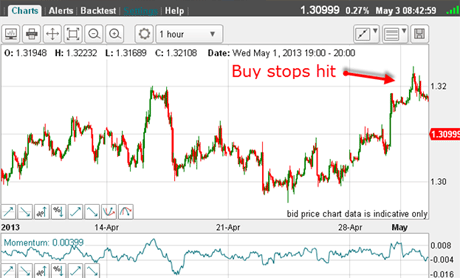Get the latest financial news, insights and expert analysis from our award-winning MoneyWeek team, to help you understand what really matters when it comes to your finances.
You are now subscribed
Your newsletter sign-up was successful
Want to add more newsletters?

Twice daily
MoneyWeek
Get the latest financial news, insights and expert analysis from our award-winning MoneyWeek team, to help you understand what really matters when it comes to your finances.

Four times a week
Look After My Bills
Sign up to our free money-saving newsletter, filled with the latest news and expert advice to help you find the best tips and deals for managing your bills. Start saving today!
Greece's prime minister, George Papandreou, made a speech this week to reassure investors that his government would take steps to tackle a budget deficit of 12.7% this year and an overall debt load hurtling towards 125% of GDP. But investors weren't reassured. The yield on ten-year Greek government debt rose again after the speech. The spread over its German counterpart is now at almost 2.5%. The fear is that Papandreou can't "stand up to the trade unions and the left wing of his party", says Breakingviews' Constantine Courcoulas.
It's not just Greece that government-bond investors are worried about. In the same week that ratings agency Fitch downgraded Greece, Standard & Poor's revised its outlook for Spain, where the budget deficit is expected to reach 9.5% of GDP this year, from 'stable' to 'negative'. That means it's at risk of a downgrade. S&P also put a negative watch on Portugal. Ireland, widely deemed on the brink of default earlier this year, has begun to slash spending radically, unlike other countries on the eurozone's periphery.
Trouble in the eurozone's periphery
These countries all joined European Monetary Union (EMU) at interest rates that were too low for their economies. This stoked an unsustainable boom in credit, property and wages. Now the bubble has burst and recession has hit. But they can't boost public spending any further as debt markets are jittery. And thanks to euro membership, they can't cut rates or devalue their currencies. Lower wages and prices are the key to restoring competitiveness and growth. But such austerity measures make the deflationary recession, and hence debt problems, worse. Spain isn't in a recession, says economist Edward Prescott. Rather, "it's in a depression".
MoneyWeek
Subscribe to MoneyWeek today and get your first six magazine issues absolutely FREE

Sign up to Money Morning
Don't miss the latest investment and personal finances news, market analysis, plus money-saving tips with our free twice-daily newsletter
Don't miss the latest investment and personal finances news, market analysis, plus money-saving tips with our free twice-daily newsletter
Will EMU survive?
"We question the ability of countries like Ireland and Greece to grow out of the current crisis," says Steve Barrow of Standard Bank. There may be "bail-outs or even pull-outs from EMU". If fiscal problems worsen, markets will once again question the feasibility of the EMU project, adds Stuart Bennett of Calyon. The key problem is that there is a single monetary policy for countries at varying stages of the economic cycle and no central fiscal authority to move large amounts of cash from rich to poor areas to temper the impact of a recession. Divergence within EMU will become "a major issue", says BNP Paribas, and a long-term negative for the euro.
Banking jitters are back
The same applies to this week's re-emergence of the "slow-burn problem of rising defaults on eastern European loan books", says Ambrose Evans-Pritchard in The Daily Telegraph. Austria has nationalised its sixth-largest lender, Hypo Group Alpe Adria a subsidiary of Germany's troubled BayernLB bank after it almost collapsed amid heavy losses on Balkan and Eastern European loans and threatened to destabilise other countries. It may not be an isolated event, according to Samir Patel of the consultancy BH2. "Things are still getting worse in the Balkans."
Meanwhile, an Austrian central bank official said that Austrian banks could need up to another e20bn of capital. Germany's Bundesbank said last month that German banks may need to write off another e90bn of bad loans. The "fundamental weakness of EMU's banking system" is why lending is so weak in the eurozone, which in turn implies that Europe's recovery could lag other regions, says BNP Paribas. No wonder, then, that the euro is at its lowest level against the dollar since early October and is set to "suffer" further.
Get the latest financial news, insights and expert analysis from our award-winning MoneyWeek team, to help you understand what really matters when it comes to your finances.
MoneyWeek is written by a team of experienced and award-winning journalists, plus expert columnists. As well as daily digital news and features, MoneyWeek also publishes a weekly magazine, covering investing and personal finance. From share tips, pensions, gold to practical investment tips - we provide a round-up to help you make money and keep it.
-
 How a ‘great view’ from your home can boost its value by 35%
How a ‘great view’ from your home can boost its value by 35%A house that comes with a picturesque backdrop could add tens of thousands of pounds to its asking price – but how does each region compare?
-
 What is a care fees annuity and how much does it cost?
What is a care fees annuity and how much does it cost?How we will be cared for in our later years – and how much we are willing to pay for it – are conversations best had as early as possible. One option to cover the cost is a care fees annuity. We look at the pros and cons.
-
 What the Latin Monetary Union – Europe’s forgotten currency – can teach us about the euro
What the Latin Monetary Union – Europe’s forgotten currency – can teach us about the euroOpinion The euro isn’t the continent’s first flawed single currency, says Jonathan Compton. The Latin Monetary Union lasted 61 years.
-
 Currency Corner: A lesson from two of the world’s “hardest” currencies
Currency Corner: A lesson from two of the world’s “hardest” currenciesFeatures Dominic Frisby looks at the Swiss franc and Singaporean dollar and what our politicians can learn from these two fiscally responsible nations.
-
 Betting on politics: deal or no deal
Betting on politics: deal or no dealFeatures Matthew Partridge looks at the bookies' odds on the UK leaving the EU with no deal.
-
 Betting on politics: how my tips have fared over the last three years
Betting on politics: how my tips have fared over the last three yearsFeatures It's been three years since Matthew Partridge launched his Betting on Politics column. As you might expect, he's some failures – but he's had a lot more successes
-
 Where did it all go right for the euro?
Where did it all go right for the euro?Sponsored SPONSORED CONTENT - The European currency is alive and kicking. Jake Trask, research director at forex house OFX, explains how the euro became a strong and stable currency, and the outlook for investors.
-
 Record low interest rates – how did the euro react?
Record low interest rates – how did the euro react?Features The euro's reaction to the interest rate decision punished many erring traders - on both sides of the market, says John C Burford. Here, he surveys the fallout, and plots his next trade.
-
Why euro bulls may stay lucky
Features With the eurozone in such a mess, everyone is expecting the single currency to plummet at any moment. But there are still some good reasons to stay long for now, says Tim Bennett.
-
Profit from volatility with forex
Features While markets hate uncertainty, it can also present opportunities. And the extra volatility it has created in the foreign-exchange market recently has created a wealth of possibilities for the short-term trader, says professional investor Jane Foley. Here, she explains how to profit.

